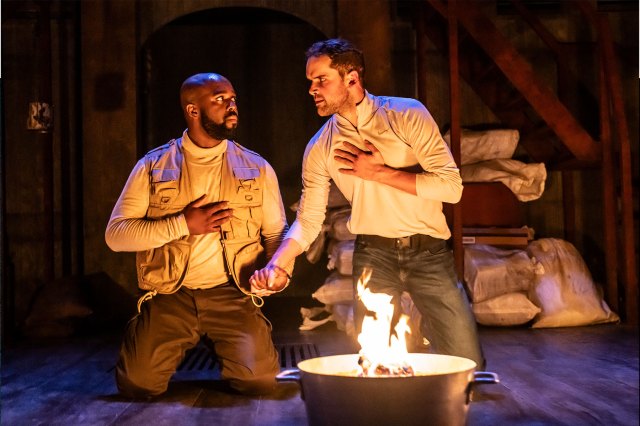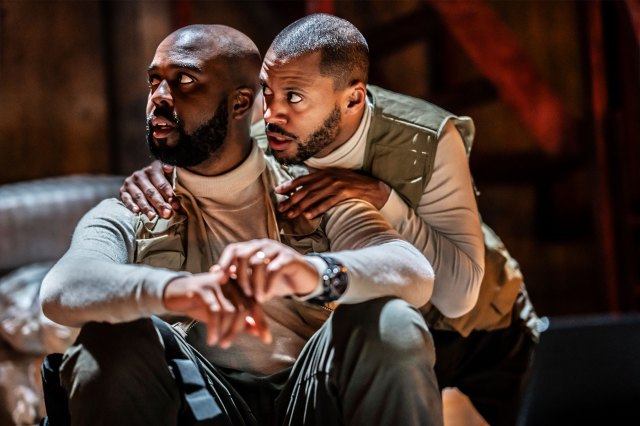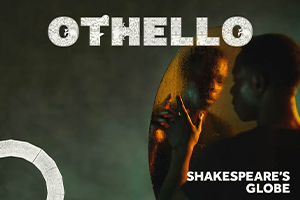Othello at the Sam Wanamaker Playhouse at Shakespeare’s Globe – review
Ola Ince’s staging continues until 13 April

An Othello for our times. It’s the promise of many a production, and understandably so. Enduringly, depressingly topical, Othello feels like a challenge to theatre makers to explore why. And there are myriad broken institutions and disillusioned sections of society to choose as their lens.
Director Ola Ince’s production takes place within the Met Police, swapping the battlefields of Cyprus for London’s docklands, where Chief Inspector Othello investigates a drug cartel. It’s an inspired premise, promising explorations of institutional racism, class, and male mental health. And the flurry of bold ideas and radical direction that follow are challenging and ambitious.
We’re thrown immediately into the now with a taser arrest, selfies at Othello’s wedding, and a rock drum solo thanks to Renell Shaw’s deft composing. Amelia Jane Hankin’s restrained design conjures an abandoned warehouse despite the theatre’s candlelit beauty. And as Othello is hauled in front of Brabantio and New Scotland Yard and speaks of “rough London estates and drug deals gone wrong”, we get our first taste of a text spiked with unabashed modernity.
While not for the purists (and less successful elsewhere in the play), here the contemporary language is deeply affecting. Othello’s singular line “I have been fighting”, delivered with a deep world-weariness, seems to speak for generation after generation of Black men.
It’s also the first time we encounter Ince’s most radical device: Subconscious Othello, played by Ira Mandela Siobhan. As Brabantio’s racist slurs rain down, Othello is calm and dignified – at pains not to play into the stereotype of the ‘Angry Black Man’. Subconscious Othello meanwhile writhes and jerks, an impressive physical manifestation of the psychological pain behind the mask. At times, this desperate dance is set to a chorus of colleagues spitting insults about Othello via their radios.

But as Othello’s mental state deteriorates, his subconscious becomes more intrusive and, sadly, distracting. Ken Nwosu is so beautifully in control as Othello, so charming and commanding, paranoid and pitiful, that we only need watch his face to see what his subconscious is up to. Tellingly, the moments after Desdemona’s murder, once Othello has knocked his subconscious out cold, were his most impactful.
Nwosu’s castmates are equally strong. Poppy Gilbert’s Desdemona is self-possessed, commanding and expecting respect while remaining loving and supportive. As Othello hits her, her hand snaps instinctively into a self-defence block, and any fear or confusion is outranked by outrage. Her true partnership makes Othello’s final agony all the more devastating. Charlotte Bate’s Emilia expertly portrays the helpless rage and resignation of modern womanhood.
Ralph Davis’s Iago is intriguing, verging on baffling. No expert Machiavellian or unhinged psychopath, he feels like a geezer with the gift of the gab who happens upon his plan almost by chance. Then finds its undertaking confusing, exhilarating, exasperating and upsetting – just some of the emotions I felt while trying to pin him down.
Perhaps this is down to him being the conduit for some of the plays underexplored themes. His rage at losing out on a promotion to ‘Eton boy’ Cassio, and the glee with which he bosses about Made in Chelsea caricature Roderigo briefly raises the question of class. And at the close of the play, the headlines brand his actions as mental health struggles. But it’s unclear whether we’re to take this to heart, or whether it’s a condemnation of the white media narrative that simultaneously labels Othello a ‘Black beast’. A narrative that I would have loved to see explored more, along with an even deeper dissection of the Met.
And that is perhaps where this production struggles a little. At times it seems to buckle under its ambition, straining to answer all of the urgent and important questions it raises. But then again, perhaps that is the point – perhaps these are not the kind of questions we should have answered for us.





















